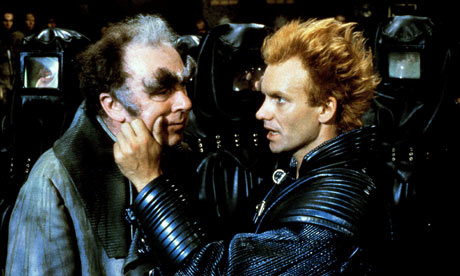
The question: What can science fiction tell us about God?
Speculative fiction (SF) is the ideal laboratory for social experimentation without direct consequence (usually). It's a literature whose boundaries lie only at the limits of the human imagination, although it is arguably better at predicting social change than it is at envisaging scientific developments, of which its track record is lively, but not as accurate as one might wish (it wasn't great at predicting advances in technological miniaturisation). When it comes to exploring sociological, philosophical and theological dynamics, however, speculative fiction is a good testing ground.
The worlds that speculative fiction depicts run the gamut from the atheist to the devout – worlds in which God is a provable absolute (Terry Pratchett's Discworld, where the gods go round to atheists' houses and throw rocks through their windows), to worlds which are the exemplars of a rationalist paradigm (Iain M Banks' Culture). In between lies a host of variations in which planets behave like deities (Solaris), gods walk the Earth in the guise of dodgy mortals (Neil Gaiman's American Gods), gods turn out to be "not what they seem" (a large number of Star Trek plots), or in which gods are simply as numerous as beetles (swathes of epic fantasy).
In much of the genre, gods function simply as a plot device – literally a "deus ex machina". From the saga of the Trojan war onwards, you have gods who assist the hero, gods who deter the hero, gods with helpful priests/priestesses and gods with fanatical followers. As a method of exploring religious issues, this kind of plot is usually a nonstarter – the gods are present as engines of story, but there are more sophisticated works in which religion is central. The Handmaid's Tale, Margaret Atwood's depiction of a near-future America in which women are stripped of their names and subjugated to male dominion, might have looked more far-fetched in a world before the Taliban took Kabul and Sarah Palin became governor of Alaska. Then as now, it was a horror story, but these days the mechanics of the society in which the story is set are easier to see in operation.
On occasion, you'd think that SF would have a hard job catching up with reality: Harold Camping's claims of imminent Rapture appear to be impervious to any amount of evidence to the contrary, yet are in part fuelled by the immensely popular Left Behind Christian SF novels by Tim La Haye and Jerry B Jenkins in which people who have been, well, left behind, have to deal with any amount of post-apocalyptic unpleasantness. Here, genre fiction and consensual reality take part in a postmodern feedback loop, bootstrapping each other into a solid edifice of belief. That the belief in question is built on conceptual sand does not mean that it's not strongly held: ideas that have the least evidential basis often prove to be the most tenacious, a phenomenon that makes rationalists (rightly) despair.
There are precedents for this – my comment in the introductory paragraph that SF-nal experimentation usually does not have consequences is defied by the whole phenomenon of L Ron Hubbard, in which a particularly dire example of genre fiction has jacked into the wish-fulfilment fantasies of Generation X and spawned the Scientology movement. In both cases we have SF that creates and is created by a religious force.
Genre deals closely with themes that are preoccupations of religion. Apocalypse features heavily, and so do creation myths and the afterlife (Philip Jose Farmer's Riverworld series is a case in point). Messiahs – of varying calibre – are a staple of genre characterisation (Robert Heinlein's Stranger in a Strange Land). Frank Herbert's Dune features a far future version of a religion that is inspired by Islam, a galaxy which is driven by religious precept, a messiah who assumes the role with reluctance and is essentially martyred in consequence. These are worlds taken to extremes, but it is in the extreme that we learn about the consequences – both positive and negative – of faith in our own day. Speculative fiction tends to be largely dystopian; religions that are unpleasant are more exciting, in terms of narrative drive, than religions in which everyone's nice to each other. Because of the diversity of genre, it's hard to draw any firm conclusions as to whether speculative fiction approves or disapproves of faith per se, but what is evident, I think, is that this diversity mirrors the messy, fluid, irrational, gloriously and horrifyingly whacked-out imaginativeness of the species from which it necessarily emerges.

